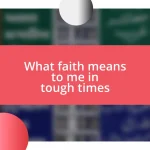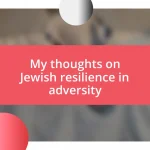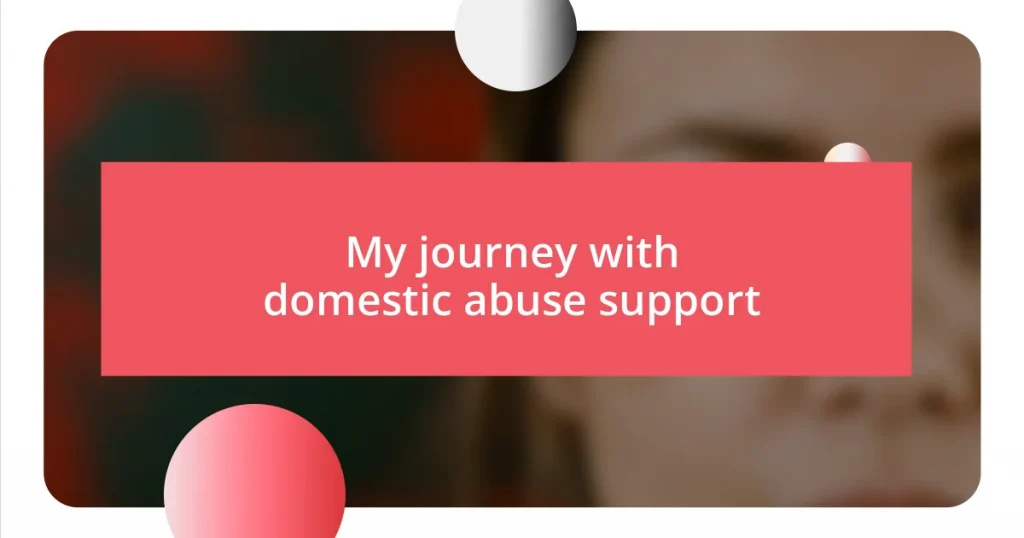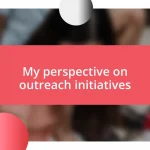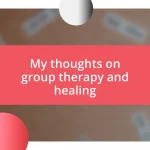Key takeaways:
- Recognizing signs of domestic abuse, such as isolation and emotional abuse, is essential for seeking help and understanding the situation.
- Building a diverse support network, including friends, local groups, and professionals, can provide emotional strength and resources for recovery.
- Developing a personal safety plan, including discreet communication methods and escape routes, empowers individuals to regain control during challenging times.
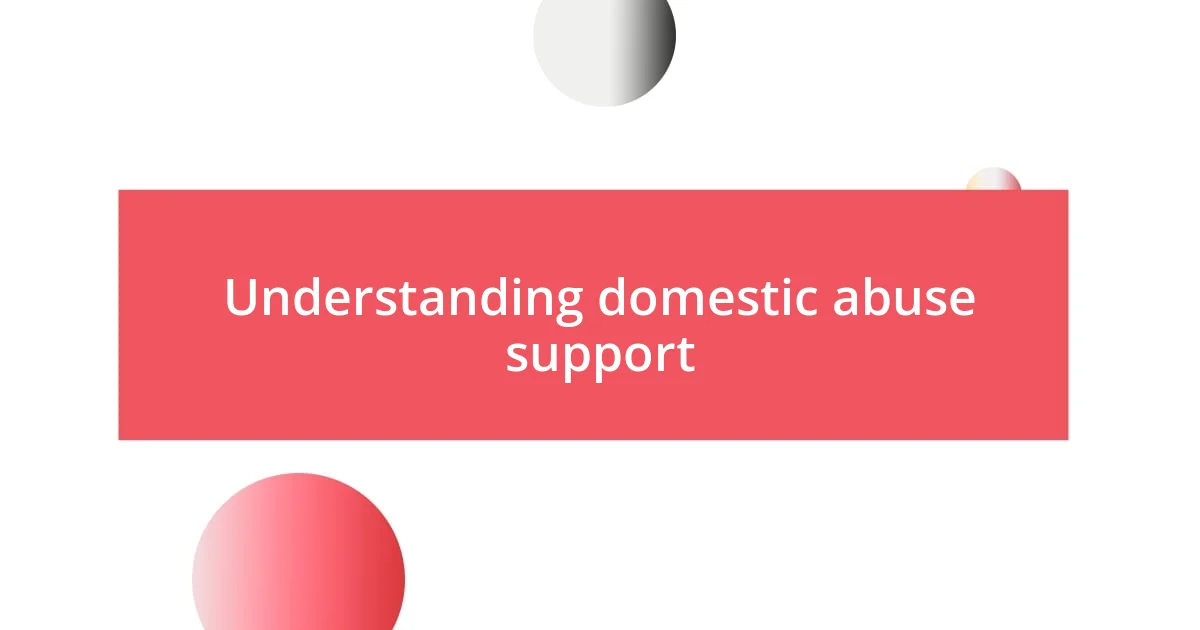
Understanding domestic abuse support
Understanding domestic abuse support can be a profound journey, one where emotions like confusion and fear often take center stage. I remember feeling overwhelmed when I first reached out for help. It was a mix of hope and anxiety—what if no one believed me? Can you relate to the weight of that uncertainty?
Support can come in many forms, from hotlines and counseling to shelters and support groups. I once attended a local support group and found solace in sharing stories with others who understood my experience. It was a powerful reminder that I was not alone, but rather part of a community that truly cared about healing. Isn’t it comforting to know that there are people ready to listen and help?
Finding the right support structure is crucial. In my case, connecting with a compassionate advocate turned out to be a lifeline. I didn’t just gain a resource; I found someone who validated my feelings and guided me on my path to recovery. Have you ever felt that kind of connection—where someone genuinely understands your struggle?
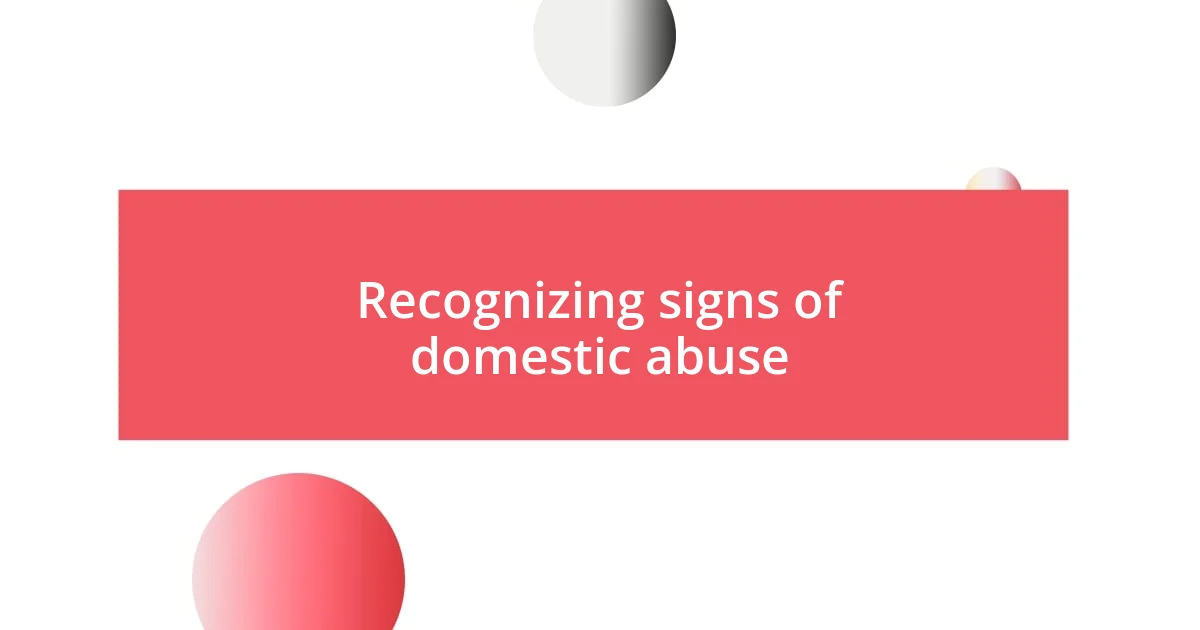
Recognizing signs of domestic abuse
Recognizing the signs of domestic abuse can be challenging, especially when you’re caught in the emotional turmoil of the situation. I recall feeling blindsided by what I later identified as red flags, such as my partner’s unpredictable moods and constant criticism. It’s easy to brush these off as stress or misunderstandings, but they can indicate a deeper problem. Knowing these signs is a crucial first step toward seeking help.
Here are some common signs to observe:
- Isolation: Your partner may discourage you from seeing friends or family, fostering dependence.
- Control: There might be strict rules about your actions or finances, leaving you feeling powerless.
- Emotional Abuse: Frequent belittling or humiliation can undermine your self-worth over time.
- Physical Violence: Any form of physical harm or threat, even if it seems minor, is a significant warning sign.
- Jealousy: Excessive possessiveness can escalate into dangerous behavior, often masked as love.
Each of these indicators matters, and recognizing them helped me realize that I wasn’t alone in my experience—many suffer in silence, unsure of how to move forward. Sharing these vulnerabilities with others in the support group opened my eyes. It underscored the importance of awareness, so if any of these resonate with you, know that there’s hope and support available.
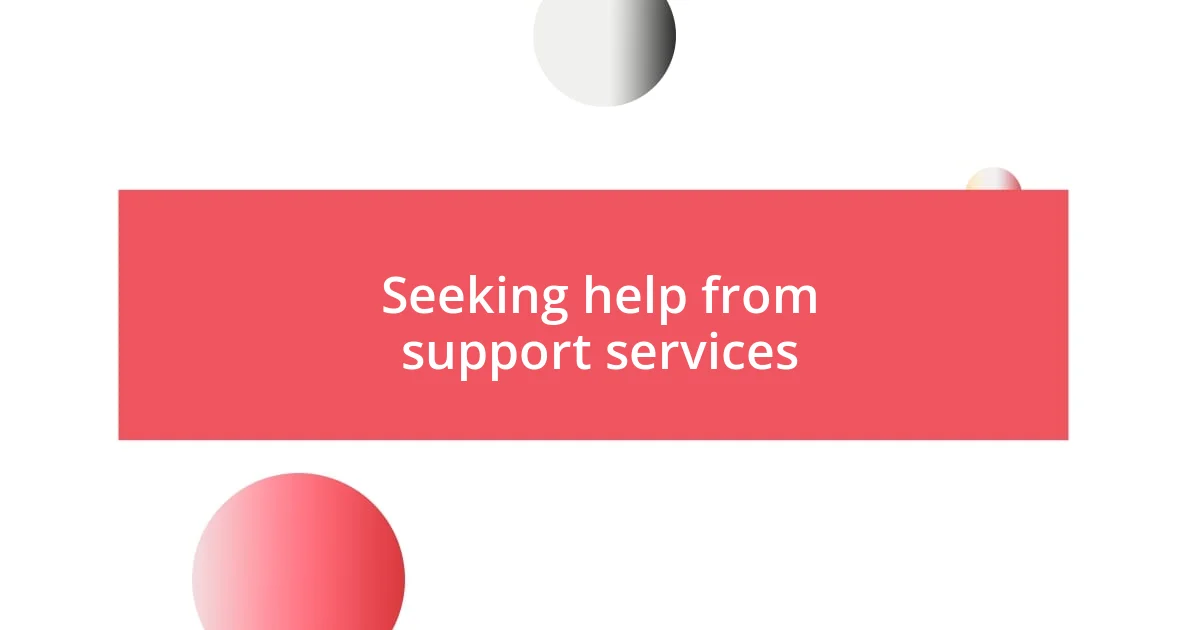
Seeking help from support services
Seeking help from support services can feel like stepping into the unknown, but it’s often the bravest choice one can make. I still remember the anxiety that washed over me as I dialed the hotline for the first time. My heart raced with each ring, but the soothing voice on the other end quickly eased my fears. It was such a relief to find that there was immediate understanding and support available.
When exploring support options, it’s essential to consider what feels most comfortable for you. In my own journey, I found that connecting with a local shelters was transformative. It felt reassuring to be in a safe environment where I had access to various resources—from counseling sessions to legal advice. Being surrounded by others who had endured similar struggles reinforced my belief that I wasn’t alone in this fight.
Additionally, I discovered that online support groups can provide flexibility and anonymity, which I found especially valuable during tough moments. I could seek help from the comfort of my home, whenever I needed it. Have you ever found comfort in unexpected places? For me, these online connections became a source of strength, allowing me to share my story and receive support from others who truly understood.
| Support Service | Description |
|---|---|
| Hotlines | Immediate support and guidance available 24/7, often anonymously. |
| Local Shelters | Safe haven offering counseling, resources, and community connections. |
| Online Support Groups | Flexible, often anonymous forums where individuals can share experiences and advice. |
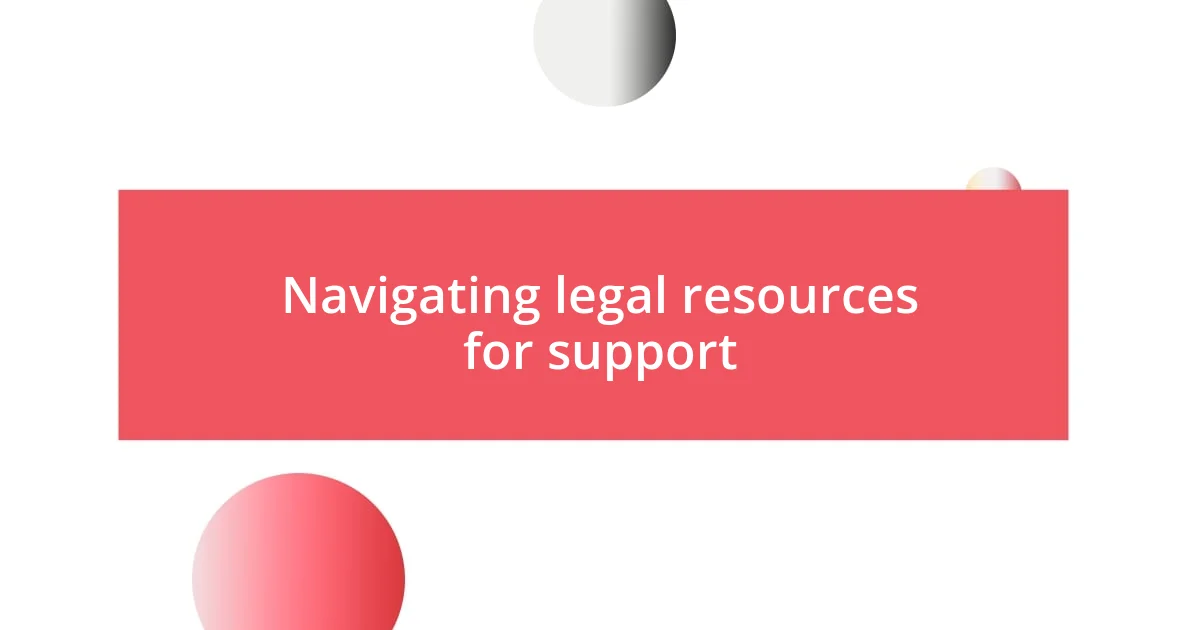
Navigating legal resources for support
Navigating legal resources can be daunting, but I learned that understanding my rights was a powerful first step. When I decided to explore my options, I was surprised to find that community legal aid organizations were ready to assist me, often at no cost. Have you ever felt overwhelmed by legal jargon? I certainly did, but the staff at these organizations broke things down into manageable steps, making the process much less intimidating.
During my journey, I sought protective orders that helped ensure my safety. I vividly remember the anxiety I felt sitting in the courtroom, surrounded by others who were also seeking justice. Yet, I found comfort in knowing there were legal advocates present, guiding me through each stage. They answered my questions and provided me with the reassurance that I had a voice, no matter how small I felt in that moment.
One thing that surprised me was how many resources exist beyond just the courtroom. Many organizations offer free workshops on navigating legal options in domestic abuse cases, which I eagerly attended. The knowledge I gained not only empowered me but also helped me form a support network with others facing similar challenges. Have you ever experienced the strength that comes from sharing knowledge with others? I certainly did, and it helped me move toward the healing I so desperately needed.
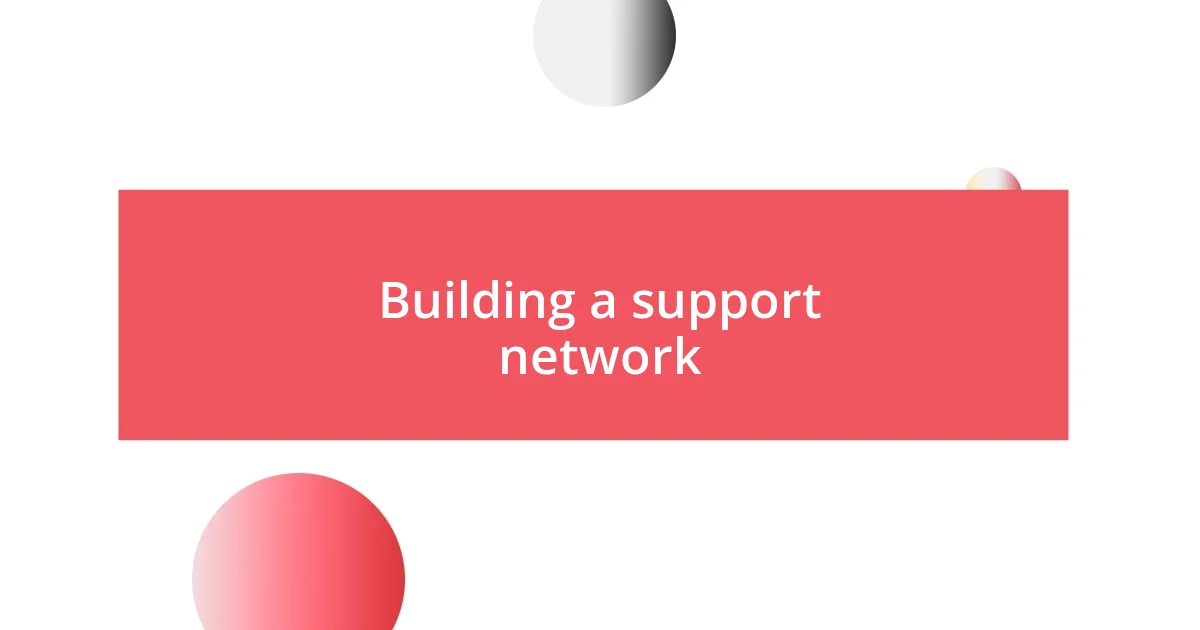
Building a support network
Building a support network was a turning point in my journey. I still remember the day I reached out to a few close friends, sharing my story for the first time. Their immediate empathy and offers to help reminded me that it’s okay to lean on others. Did you know that sometimes vulnerability can strengthen your relationships? I found that being open created bonds that I never thought possible.
I also discovered the importance of diversifying my support network. While friends provided emotional comfort, joining local support groups opened new avenues for connection. It was energizing to meet individuals who had navigated similar circumstances. Have you ever felt an instant connection with someone over shared experiences? Those moments reinforced my belief that together, we could lift each other up.
In the midst of building this network, I learned to reach out to professionals as well. My therapist became a crucial part of my support system, offering invaluable tools to process my emotions. How often do we underestimate the power of professional help? I realized that bringing in someone with expertise not only enriched my understanding of my situation but also made my network more robust and well-rounded.
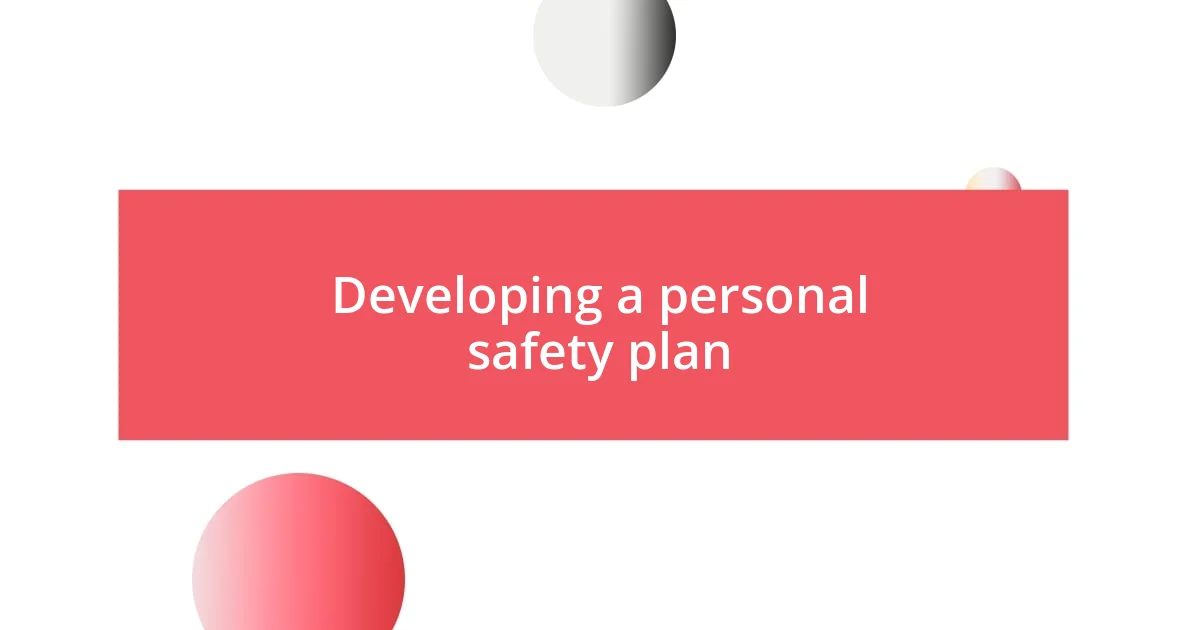
Developing a personal safety plan
Developing a personal safety plan was one of the most crucial steps I took during my journey. I remember sitting down one evening, overwhelmed with emotions, and jotting down what I needed to feel safe. This wasn’t just a checklist; it was a reflection of my hopes and fears. Have you ever felt a rush of clarity when organizing your thoughts? For me, breaking everything down into specific actions, like keeping a bag packed or identifying safe places to go, helped turn anxiety into proactive steps.
One aspect I never underestimated was the importance of having a code word with my trusted friends. I’ll never forget the first time I tested it. I felt as if my heart was racing while I typed a simple message asking for help. Knowing that I had a discreet way to signal for assistance not only made me feel secure but also empowered me in a way I hadn’t experienced before. Have you ever created a safety net for yourself? It’s often in these small, strategic choices that we find strength.
Throughout this process, I also realized the significance of having multiple escape routes in mind. I used to focus solely on physical safety, but as my understanding grew, I recognized that emotional safety is equally vital. I spent time researching local shelters and support services, coupled with mapping out my surroundings. It felt freeing to know my options. Knowing where to go and what to do gave me a sense of control over my life during a time when everything else felt chaotic. Isn’t it empowering to visualize a way out? Having a clear plan helped me reclaim a sense of agency in my life.

